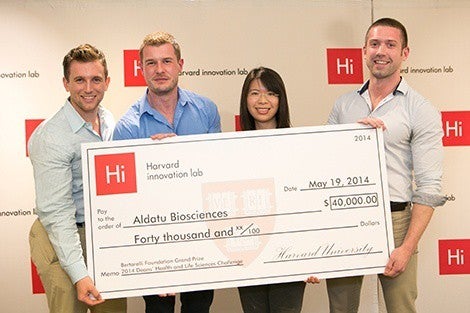May 28, 2014 — HIV is now considered a chronic but manageable infection with the proper medication, but 10% of patients every year develop resistance to the drugs they are prescribed. Now, an affordable and quick test for drug resistance developed at Harvard School of Public Health (HSPH) will enable health care providers to match patients with the most effective drugs earlier in their treatment program. This technology, and its developers’ mission to bring it to low-resource countries where the need is greatest, earned top honors for team Aldatu Biosciences in the Deans’ Health & Life Sciences Challenge.
The competition was one of three Deans’ Challenges sponsored by Harvard’s Office of the President and the Provost. Hosted by the Harvard Innovation Lab (i-lab), the Deans’ Challenges, along with the President’s Challenge, are open to Harvard undergraduates, postdoctoral students, and clinical fellows. The six finalist teams in each Deans’ Challenge received $5,000 and the opportunity to work with i-lab mentors and resources to further develop their projects.
Winners in the Health & Life Sciences Challenge, which was co-chaired by Dean Nitin Nohria of Harvard Business School (HBS) and Dean Jeffrey Flier of Harvard Medical School (HMS), were announced during a Demo Day held at the i-lab on May 19, 2014. Aldatu received the grand prize of $40,000.
Aldatu (which means “change” in the Basque language) uses the drug resistance genotyping test known as PANDAA developed two years ago by team member Iain MacLeod, and Christopher Rowley, both research associates working with Max Essex, Mary Woodard Lasker Professor of Health Sciences, in the Department of Immunology and Infectious Diseases. The team of four also includes students from HMS and HBS. Rowley, MPH ’04, serves as a consultant.
“The Deans’ Challenge really helped us to focus on translating the technology to ensure that we could get HIV drug resistance testing to the patients it was invented to benefit,” said MacLeod. “We’ve been encouraged by the enthusiasm that we’ve received from the academic and biotech communities. There is clearly an urgent, unmet need in developing countries for a more affordable and sensitive test.”
In the coming months, Aldatu will continue working to develop PANDAA and pursue potential funding mechanisms. The team also hopes to explore other diseases that the technology could address, MacLeod said. “We’ve got a lot of ideas, and we hope that HIV drug resistance testing is just the beginning for Aldatu.”
Read Harvard Gazette coverage: Aldatu Biosciences wins Deans’ Health and Sciences Challenge
Photo: Evgenia Eliseeva
